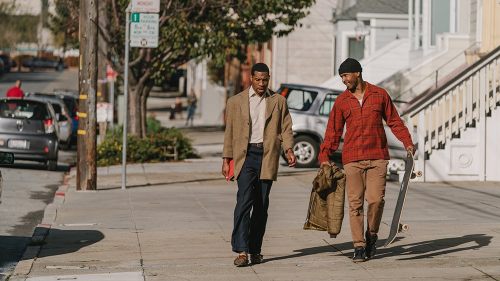Sundance Review: THE LAST BLACK MAN IN SAN FRANCISCO Is A Beautiful Celebration Of Individuality
The Last Black Man in San Francisco is a delightfully full film, one offering viewers a ton to think about and discuss. More than anything, however, I’m surprised how easy it is to watch.
Joe Talbot’s film is deep and important, and yet watching it is a breeze. It exudes an energy both joyful and innocent. It’s charming, even fun. You learn to enjoy and deeply care for all its main characters. It’s not short, but the two-hour running time flies by and feels narratively justified.
But most of all it is unique, which is in perfect keeping with its characters and themes. The Last Black Man in San Francisco focuses primarily on two young men who naturally fall far from culture’s prescribed stereotypes. One (Jimmy Fails playing a character named Jimmy Fails) is a prideful handyman who spends his non-working hours maintaining the house his grandfather built in 1946 and his family lost in the ‘90s, whether the upper class old white people currently living there like it or not. The other (Montgomery, played by Johnathan Majors) is a gentle observer and writer who dresses in the tidy layered style of an old man.
Montgomery gives Jimmy a stable home with his blind grandfather (Danny Glover) while Jimmy offers Montgomery respect and friendship he’s not likely to find among his more modern peers. The two are outsiders in their own culture, which makes them outsiders in all cultures. But they have each other and they are inseparable.
When a family dispute leaves Jimmy’s beloved house empty and unlikely to be filled any time soon, he decides to reclaim it, fixing up the inside and refilling it with his grandfather’s furniture that had been languishing in storage. It offers a freedom to Montgomery and for Jimmy, a purpose.
But we know this can’t last forever. This is their city, but they are barely allowed to exist within its economic impossibilities. There are a lot of elements I’m skipping over, but they are peripheral to these two characters and their central friendship, which is simply a pleasure to watch. Talbot directs the film with such beauty, hardly a shot goes by without some noticeable detail. The score by Emile Mosseri is as unique and anachronistic as the film’s characters and mixes with all the other elements in a perfect concert of tone and theme.
The Last Black Man in San Francisco is special, a gentle film that is both nourishing and entertaining in equal measure. See it when you get the chance.



